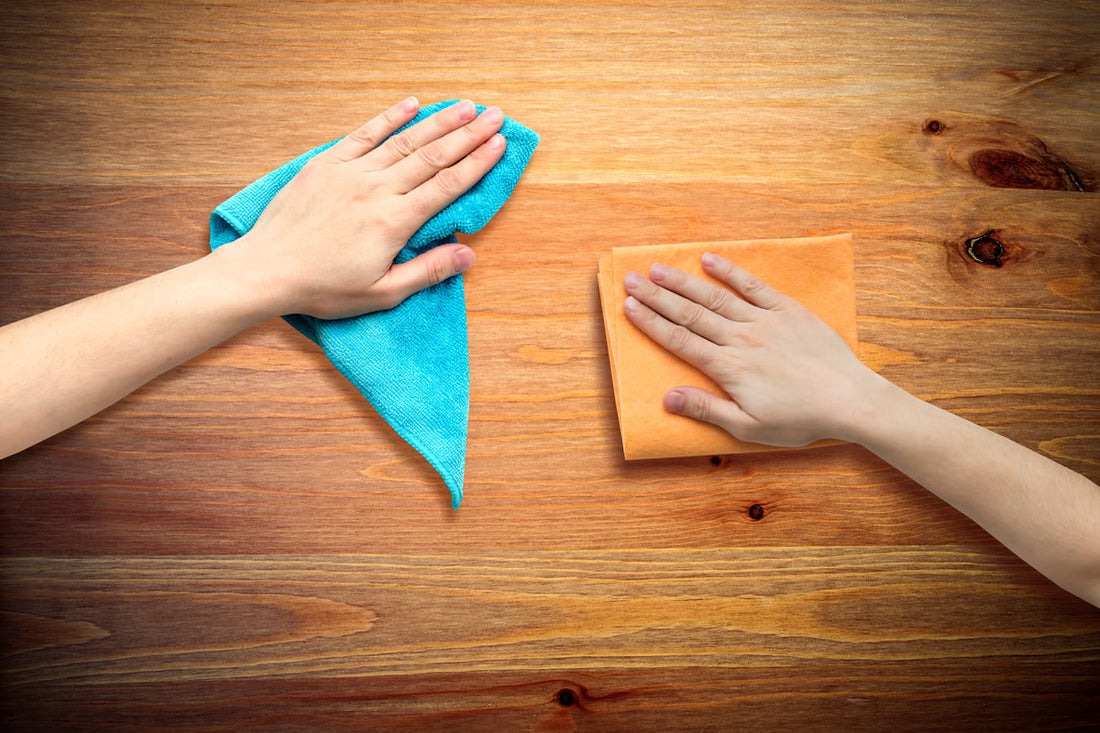In the heart of our homes, the dining table serves as a gathering place for cherished moments and shared meals. However, maintaining its pristine condition requires more than just a quick wipe. In this comprehensive guide, we'll explore the intricacies of how to clean your dining table effectively, ensuring it remains a focal point of cleanliness and elegance.
From tackling stubborn stains to preserving the integrity of different table materials, we delve into practical steps and expert tips. Discover not only how to clean your dining table but also the proactive measures on how to keep your dining table clean, enhancing both its longevity and the enjoyment of your dining experience.
All What You'll Need
Maintaining the cleanliness and longevity of your dining table involves selecting the right cleaning tools and products tailored to the specific material. Whether you have a wooden, ceramic, or glass dining table, here is a comprehensive guide outlining the essentials you'll need for effective and safe cleaning:
For Wooden Dining Tables:
- Microfiber Cloths
- Wood Cleaner
- Soft Bristle Brush
- Wood Polish
For Ceramic Dining Tables:
- Mild Dish Soap
- Soft Sponge or Cloth
- White Vinegar
- Ceramic Cleaner
For Glass Dining Tables:
- Glass Cleaner
- Microfiber or Lint-Free Cloth
- Rubbing Alcohol
- Newspaper or Coffee Filters
How To Clean Dining Table: A Step-By-Step Guide
Wooden Dining Table
The foundation of a pristine dining table lies in regular cleaning. Gently dust the surface with a soft, lint-free cloth to remove everyday debris. This simple yet crucial step prevents the accumulation of dirt and protects the wood's finish over time.

Accidents happen, and stains can be inevitable. Tackling stains promptly is essential. Dampen a cloth with a mild solution of water and dish soap, gently rubbing the stain in a circular motion. For stubborn stains, a mixture of baking soda and water forms a natural yet effective stain remover.
Watermarks or wet spots can mar the table's appearance. Swiftly address these by gently rubbing the affected area with a mixture of equal parts vinegar and olive oil. This natural solution not only removes water spots but also nourishes the wood, leaving behind a lustrous finish.
Prevention is key to preserving your wooden dining table. Place coasters under glasses, use placemats during meals, and avoid placing hot items directly on the table's surface. These small precautions go a long way in maintaining the table's pristine condition.
Wood is sensitive to temperature fluctuations. Avoid placing your dining table near radiators or direct sunlight, as prolonged exposure can lead to warping or discoloration. A strategically positioned table ensures its longevity and minimizes the need for extensive cleaning.
Wooden furniture responds to changes in humidity. Maintain a stable indoor humidity level to prevent the wood from expanding or contracting. Using a dehumidifier or humidifier as needed helps mitigate the risks associated with extreme humidity fluctuations.
Consistency is key to a well-maintained dining table. Develop a habit of cleaning the table after every use, removing crumbs and spills promptly. This proactive approach prevents the build-up of grime and simplifies the overall cleaning process.
Regular polishing enhances the beauty of your wooden dining table. Opt for a high-quality wood polish or make your own using a mixture of olive oil and white vinegar. This nourishing blend not only adds shine but also acts as a protective barrier against future stains.
For added protection, consider sealing the wooden surface periodically. This step safeguards the table against spills and stains, making it easier to clean. Consult with the table's manufacturer or follow their recommendations for the best sealant suitable for your specific wood type.
Ceramic Dining Table
Initiate the cleaning process by clearing the table of loose particles. A soft-bristle brush or a dry cloth can be gently used to sweep away any crumbs, dust, or debris that may have settled on the surface. This preliminary step prevents scratching during subsequent cleaning.

Dampening a soft cloth or sponge with warm water is the next crucial step. This initial moistening helps to break down and lift surface-level dirt without causing damage to the ceramic finish. Using warm water is gentle yet effective in preparing the table for a thorough clean.
Gently wipe the damp cloth or sponge across the ceramic surface, ensuring an even coverage. The inherent smoothness of ceramic makes this step straightforward, allowing for the swift removal of dirt and grime. A gentle wiping motion ensures an effective clean without the risk of scratches.
For stubborn stains or dried-on residues, a mixture of warm water and mild dish soap comes to the rescue. Dab a cloth into the soapy solution and gently rub the stained area. This approach effectively breaks down tougher stains without compromising the ceramic's integrity.
Thoroughly rinse the entire table with clean water to remove any soap residue. This step is critical in preventing soap buildup, which can dull the ceramic's luster over time. A careful rinse ensures a clean and residue-free surface, maintaining the table's visual appeal.
Using a microfiber towel, carefully dry the ceramic surface. The ultra-soft nature of microfiber prevents any potential scratching, and its absorbent quality ensures a streak-free finish. Proper drying is essential to prevent water spots and maintain the table's glossy appearance.
For added shine, an optional step involves using white vinegar. A mixture of vinegar and water, when applied with a soft cloth, provides an effective and natural method to enhance the ceramic's sheen. This step adds an extra layer of brilliance to the table's finish.
Ceramic-specific cleaners are available for those seeking an additional layer of protection. These cleaners are designed to gently clean and protect the surface, leaving behind a protective barrier that makes future cleaning easier. Choose a high-quality ceramic cleaner for optimal results.
Consistent care is the key to preserving the beauty of a ceramic dining table. Regularly dusting and quickly addressing spills or stains can prevent the need for intensive cleaning sessions. This proactive approach ensures an easy-to-clean dining table, simplifying maintenance in the long run.
Glass Dining Table
Begin the cleaning process by gently removing any loose crumbs, dust, or debris from the glass surface. This prevents scratching during the subsequent cleaning steps. A soft-bristle brush or a microfiber cloth is an excellent choice for this task, as they effectively lift particles without causing damage.

To create an effective cleaning solution, mix equal parts water and white vinegar in a spray bottle. White vinegar is a powerful natural cleaner that helps break down grease and removes stains without leaving behind residue. The acidity of vinegar ensures a thorough and sanitary cleaning.
Evenly spray the cleaning solution over the entire surface of the glass table. This step ensures that the cleaning solution covers all areas, making it easier to remove grime and stains. The application of the solution should be generous but not excessive, preventing wastage while allowing for effective cleaning.
Allow the cleaning solution to sit on the glass surface for a few minutes. This dwell time is crucial for the vinegar to penetrate and loosen any stubborn stains or residues on the table. This is a proven method that ensures a deeper clean and easier removal of dirt and grime.
Using a soft, lint-free cloth or a microfiber towel, gently wipe the glass surface. The combination of the cleaning solution and the soft cloth effectively removes dirt and stains, leaving your dining table gleaming and spotless. This method minimizes the risk of scratches or streaks.
After wiping the glass surface, use a clean, dry cloth to buff and dry the table thoroughly. This step eliminates any remaining cleaning solution, preventing streaks and ensuring a crystal-clear finish. The buffing process adds a polished shine to the glass, enhancing its overall appearance.
Inspect the glass for streaks or residue. If streaks are present, use a clean, dry cloth to buff them away. This attention to detail ensures that your glass dining table maintains its transparency and brilliance.
For an extra touch, consider using newspaper or coffee filters in place of a cloth during the wiping and buffing steps. These materials are known for leaving a streak-free shine on glass surfaces. Their absorbent nature also contributes to a faster and more efficient cleaning process.
If stubborn stains persist, apply a small amount of baking soda to a damp cloth and gently rub the stained area. Baking soda's mild abrasive properties aid in removing tough stains without scratching the glass. This method provides a targeted solution for specific blemishes.
To keep your glass dining table in optimal condition, make regular maintenance a habit. Clean it at least once a week using the above steps, and promptly address any spills or stains. This proactive approach will ensure that your glass dining table remains a centerpiece of beauty in your home.
Tips For Maintaining a Clean and Hygienic Table
Establishing Guidelines for Table Utilization
Creating a clean and hygienic dining table is essential for maintaining a healthy living environment. To achieve this, it is crucial to establish guidelines for table utilization. Encouraging family members or guests to use placemats and coasters can prevent direct contact between surfaces and hot or cold items, minimizing the risk of damage or stains. By adhering to these guidelines, the lifespan of your dining table is extended, and its aesthetic appeal is preserved.
Employing Table Mats and Covers
In addition to guidelines, employing table mats and covers offers both practicality and style. Opt for materials that are not only easy to clean but also complement your decor. Consider vinyl or laminated fabric for an easy to clean dining table that effortlessly combines functionality with elegance. These protective layers act as a barrier against spills, scratches, and heat, ensuring the longevity of your dining table while simultaneously enhancing its visual appeal. For a more personalized touch, explore various decor dining table ideas that seamlessly integrate with your home's overall aesthetic.

Performing Table Cleanup Following Every Use
Performing a thorough table cleanup following every use is a fundamental practice in maintaining a pristine dining surface. Clearing away leftover crumbs, spills, or stains immediately prevents them from becoming stubborn and difficult to remove later. The best way to clean dining table largely depends on its material, so consult the manufacturer's guidelines for specific care instructions. Regular and prompt cleaning not only keeps your table looking immaculate but also contributes to a healthier dining environment, eliminating potential breeding grounds for bacteria.
Integrating Table Cleaning Into Your Daily Schedule
Integrating table cleaning into your daily schedule is the cornerstone of maintaining a consistently clean dining space. Allocate a few minutes each day to wipe down the table, addressing any minor spills or stains. This proactive approach not only saves time in the long run but also ensures that your dining table remains inviting and free from unsightly marks.
By incorporating these tips into your routine, you not only enhance the longevity and appeal of your dining table but also create a welcoming space for memorable meals and gatherings. For further insights and recommendations, consider consulting a comprehensive dining table buying guide to make informed decisions that align with your lifestyle and preferences.
Conclusion
In conclusion, maintaining a pristine dining table is a simple yet transformative practice for a hygienic and inviting home. Whether you own a classic wooden table or a sleek contemporary dining table, the principles of cleanliness remain universal. This step-by-step guide on how to clean a dining table empowers you to preserve its beauty and functionality.
By incorporating easy-to-follow cleaning routines and utilizing appropriate cleaning agents, you can ensure that your dining table becomes a focal point of elegance in your living space. With these straightforward steps, you not only enhance the longevity of your furniture but also create a welcoming environment for shared meals and cherished moments.





